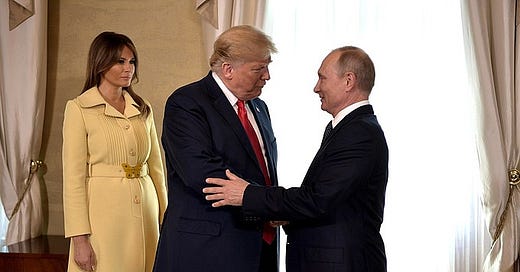Trump hands Putin a Munich triumph
The organising truth behind the US administration’s capitulation over Ukraine is that Trump agrees with Putin
Those attending the Munich Security Conference during the years before Vladimir Putin’s second war against Ukraine in 2022 were obliged to sit through a dreary annual ritual. Sergey Lavrov would appear at the podium. Delivering a long finger-wagging lecture on the west’s “broken promises” after the collapse of the Soviet Union, the Russian foreign minister would demand the creation of a new European security order to recognise Russia’s primacy in the eastern half of the continent.
A veteran former diplomat lacking an ounce of charisma, Lavrov never altered his monotonal jeremiah. The perfidious west had reneged on its pledge that Nato would not expand eastwards. Russia faced hostile forces on its borders. Assuring the European peace required a security architecture that excluded outside powers. For outside powers, read the United States.
In 2007 Putin delivered the message personally; and the following year Russian troops marched into Georgia to demonstrate Moscow’s determination to control its own neighbourhood. Lavrov continued to play the same cracked record until the Russians were barred from the conference in 2023.
It’s not hard then to imagine the satisfaction in the Kremlin this week with Donald Trump’s telephone call to Putin and the accompanying commentary at Nato of US defence secretary Pete Hegseth. A US president had finally listened, handing Putin and Lavrov the prize they had always sought - the breaking of the Atlantic alliance and American disengagement from Europe.
What’s more the White House is showing Putin the respect his vanity craves. Barack Obama dismissed Russia as a “regional power”. After 2022 Putin became a pariah, cast out of the Group of 8 leading nations. Trump is treating him as an equal with whom he is ready to negotiate the terms of a peace in Ukraine.
The Ukrainians and their European partners are offered only walk-walk on parts in this framework. Reading a script that might have been drafted in Moscow, Hegseth announced at Nato headquarters in Brussels that Ukraine could not expect to restore its borders. It would not be admitted to Nato, and the US would not deploy any troops to guarantee a peace deal. Lavrov must be pinching himself. Finally, someone had listened. All those speeches were worth it.
As ever with Trump pronouncements, there were some subsequent “clarifications”. Vice president J D Vance arrived in Munich with charges of 1930s-style appeasement ringing in his ears. When he took some time out from rebuking his European hosts for their refusal to accommodate right-wing extremists and demonise immigrants, he denied Trump would be a pushover at the negotiating table,
He was wholly unconvincing. Setting aside that Trump once said he preferred to accept Putin’s word over that of his own intelligence services, the organising truth behind the administration’s stance is that Trump agrees with Putin that might is right. Europeans want to preserve a rules-based order. China, Russia and now the US think the powerful should run their own neighbourhoods.
Hence Trump’s threat to retake control of the Panama canal, annex Greenland and subjugate Canada. His rationale is no different from that of Putin. America is powerful, so it can do what it pleases in pursuit of its security interests. Left to themselves, Trump and Putin would might well settle on deal that gave Ukraine to Moscow and Greenland to Washington.
Trump, Vance, Hegseth - these are not strategic thinkers. Missing from their transactional approach are the broader consequences for American power. It offers an invitation to China to invade Taiwan. Just as the Panama canal is a strategic waterway for the US, control of the South China Sea is a vital security interest for Beijing.
When Chinese officials are criticised for menacing Taiwan, building military bases on disputed islands in the South China sea and claiming sovereignty over the Senkaku islands in the East China Sea they cite the Monroe Doctrine formulated by the US during the 19th century to assert its primacy in the western hemisphere.
Hegseth told Nato counterparts that the administration’s goal was to shift military resources from Europe to East Asia. The reality is surrender in Ukraine weakens the US in the confrontation with China. Victory for Putin is also a victory for his ally Xi Jinping in his effort to establish hegemony in the western Pacific. There, and in the Middle East and Africa, the unequivocal message sent to America’s friends is that it can no longer be regarded as trusted ally.
The response this demands from Europe is no mystery. France’s Emmanuel Macron set it out five years ago when he invited his European counterparts to consider life after Nato. They have now run out of “consideration” time. If European nations want to defend themselves against Russian aggression and Chinese coercion they must supply themselves with the means to do so,
The first task is to give Ukraine all means possible to prevent the capitulation envisaged by Trump. A good starting point would be to transfer Russia’s frozen assets to Kyiv for use in the war effort. The second, a long-term project, is to build a shared security architecture independent of Washington and sufficiently robust to deter Moscow. The best to be hoped of the US is that a future president will reclaim some of that country’s democratic values. The American security shield is gone forever.



This joins up a lot of dots in the mountain of Ukraine-Trump comments
A coherent assessment of the challenges that Europe - including the UK - must face in to.